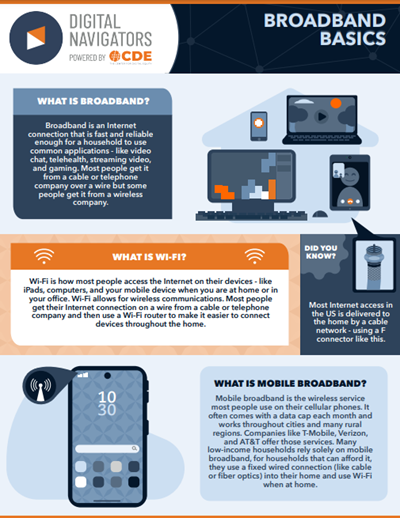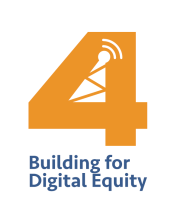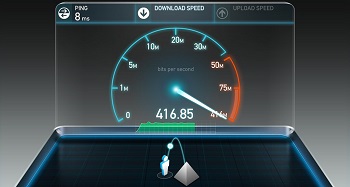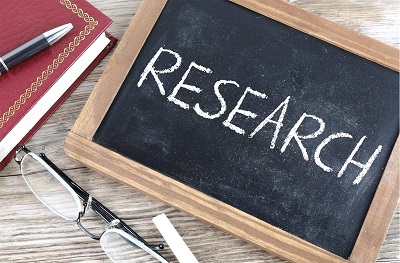
Fast, affordable Internet access for all.


This week on the podcast, Christopher speaks with Blair Levin, the former executive director of the National Broadband Plan, to discuss the landscape of broadband and telecommunications and its significance moving into 2024.
Chris and Blair delve into discussions on the FCC and its imperative to address critical issues such as the Affordable Connectivity Program (ACP) and the fate of Title II.
The conversation continues with topics on the potential for industry mergers, the evolving landscape of fixed wireless and fiber networks, and the persistent challenges associated with achieving universal service and bridging the digital divide. It concludes with touching upon the critical fiber-copper divide and underscores the importance of local government initiatives in expanding fiber networks.
This show is 44 minutes long and can be played on this page or via Apple Podcasts or the tool of your choice using this feed.
Transcript below.
We want your feedback and suggestions for the show-please e-mail us or leave a comment below.
Listen to other episodes or view all episodes in our index. See other podcasts from the Institute for Local Self-Reliance.
Thanks to Arne Huseby for the music. The song is Warm Duck Shuffle and is licensed under a Creative Commons Attribution (3.0) license.
As our team continues to work with state and local community organizations across the country to help build digital skills and offer broadband educational resources, we came across this handy Broadband Basics Fact Sheet we wanted to share from the Queens at Queens University of Charlotte Center for Digital Equity (CDE).
In simple, accessible language, the two-page fact sheet from CDE explains commonly used words related to Internet access that are often not well-defined or understood outside of the tech industry.

The fact sheet serves as a useful reminder that Internet access terminology itself can be a barrier to greater adoption, which is why we like CDE’s work here in answering the following questions:
The fact sheet can be found by clicking link below:

This week on a special edition of the podcast, join us as we begin with a discussion with local leaders from East Carroll Parish, Louisiana. First Featured on ILSR's Building Local Power podcast, this first segment reveals the hurdles the leaders faced with expensive and inadequate broadband service.
Despite resistance from a regional monopoly provider, their grassroots efforts to enhance Internet access triumphed. Explore with them on how they overcame obstacles and misleading data that was hindering competition.
Lest you think the situation in East Carroll Parish wasn't that bad, in the second segment we journey back to a 2014 episode of the Community Broadband Bits podcast. Christopher and Lisa parody the (based-on-real-life!) experience of trying to talk to the customer service of Big Cable companies, maybe hitting a little too close to home.
This show is 41 minutes long and can be played on this page or via Apple Podcasts or the tool of your choice using this feed.
Transcript below.
We want your feedback and suggestions for the show-please e-mail us or leave a comment below.
Listen to other episodes or view all episodes in our index. See other podcasts from the Institute for Local Self-Reliance.
Thanks to Arne Huseby for the music. The song is Warm Duck Shuffle and is licensed under a Creative Commons Attribution (3.0) license.

This week on the podcast, Christopher speaks with Valerie Fast Horse, the IT director and creator of Red Spectrum for the Coeur d'Alene Tribe. Red Spectrum, a broadband company, serves the Coeur d'Alene Reservation in North Idaho, covering nearly 380,000 acres of land.
Chris and Valerie discuss the history of the Red Spectrum and the efforts made over time to upgrade its infrastructure and continue to offer residents high-quality connections – transitioning from fixed wireless to fiber-to-the-home projects.
Valerie also discusses how Red Spectrum has expanded its services over the years, including subscribers both inside the reservation and areas outside of it, as well as barriers to expanding and the challenges of competition from other providers such as Starlink.
Despite the challenges they face, Red Spectrum continues to grow its network and uphold its high customer satisfaction rate, even bringing back subscribers who originally left for Starlink. Chris and Valerie conclude the conversation by emphasizing the importance of personal interest, community involvement, and local talent in building small, successful community broadband networks.
This show is 22 minutes long and can be played on this page or via Apple Podcasts or the tool of your choice using this feed.
Transcript below.
We want your feedback and suggestions for the show-please e-mail us or leave a comment below.
Listen to other episodes or view all episodes in our index. See other podcasts from the Institute for Local Self-Reliance.
Thanks to Arne Huseby for the music. The song is Warm Duck Shuffle and is licensed under a Creative Commons Attribution (3.0) license.

Ebony Cooksie is the Market Development Manager and Government Affairs Coordinator for NextLink Internet and we talked at Net Inclusion about how she transitioned from working in education to digital equity. With so many people new to this field, transitioning often from health and medical fields, we thought it would be helpful to talk about the transition.
This show is 13 minutes long and can be played on this page or using the podcast app of your choice with this feed.
Transcript below.
We want your feedback and suggestions for the show-please e-mail us or leave a comment below.
Listen to other episodes here or see other podcasts from the Institute for Local Self-Reliance here.
Thanks to Joseph McDade for the music. The song is On the Verge and is used per his Free-Use terms.
In this week’s round-up of broadband news, we culled three stories we think are worth reading.
How Much is Fast Enough?
The first is a story from Ars Technica – FCC chair: Speed standard of 25Mbps down, 3Mbps up isn’t good enough anymore – written by veteran IT reporter Jon Brodkin.
For years now, broadband-for-all advocates have lamented the FCC’s minimum broadband speed standard of 25 Megabits per second (Mbps) download and 3 Mbps upload as being laughably antiquated. Indeed, it’s been almost three years since we made the case for Why 25/3 Broadband Is Not Sufficient, though it was outdated long before then.

But as Brodkin reported this week, the FCC’s minimum speed standard “could finally change under Chairwoman Jessica Rosenworcel, who is proposing a fixed broadband standard of 100Mbps downloads and 20Mbps uploads along with a goal of bringing affordable service at those speeds to all Americans.”
Under Rosenworcel’s plan, the FCC would look at availability, speeds, and prices to determine whether the agency should take regulatory actions under Section 706 of the Telecommunications Act, which requires the FCC to determine if high-speed Internet access is being deployed "on a reasonable and timely basis" to all Americans.
Now that there’s broad consensus high-speed Internet connectivity should be universally accessible, there’s no shortage of broadband news/content floating around out there.
There’s the wheat (more truthful, useful, and informative stuff); the chafe (a mundane grain of truth buried under a steaming pile of bs), and a vast spectrum of perspectives in between.
In this new space we will highlight insightful news stories, blog posts, podcasts, or videos we’ve come across over the past week or so – with an eye to separate the signal from the noise.
Downloading now …
What Happened to Gigi?
While the FCC has been defanged in many ways, the agency is still at the center of our shared telecommunication ecosystem. So when President Biden nominated Gigi Sohn to serve as the fifth and final commissioner to break the 2-2 partisan deadlock at the agency, numerous consumer and public interest groups were ecstatic. The nation’s telecommunication workers backed her nomination. She even had the respect and quiet support of a number of conservative lawmakers.
But her nomination was sunk by a vicious smear campaign, which led her to withdraw herself from consideration in March.
At the Broadband Communities Summit in May she described the process both like being put in a “washing machine full of rocks” and going through “a 16 month proctology exam.”
In its ongoing effort to support a new generation of broadband scholars, practitioners, and advocates, the Benton Institute for Broadband & Society has put out the call for new Opportunity Fund Fellowship applicants for the 2023-2024 cycle.
The Institute is looking for fellowship proposals that are particularly focused on:
While that is not an exhaustive list of possible proposals, the Institute says it will “welcome other proposals of critical importance to our field that can better inform our current or emerging broadband policy debates,” adding that “we especially welcome applications that focus on historically marginalized communities.”

Fellowships will range from $5,000 to $20,000 with a tenure ranging from 6 months to 2 years.
The application deadline is August 15.
More information about the fellowship can be found here. Questions about the fellowship opportunity should be emailed to fellowships@benton.org.
Joined by an array of leading broadband experts, infrastructure investment fund managers, institutional investors, private equity, and venture capitalists will gather in the nation’s capital next week for a day-long in-person conference to discuss and explore the digital infrastructure and investment asset profile required to support a 21st century information economy.
The Annual Digital Infrastructure Investment conference, which brings the broadband infrastructure and financial services communities together, will be held on Thursday, November 17, 2022, at Clyde’s of Gallery Place in Washington, D.C. And though spots are filling up fast, there is still time to register to attend here.
The conference program will begin at 8:30 a.m. and run until 3:30 p.m. and will feature four panels. The first panel – What’s the State of the Infrastructure Investment and Jobs Act (IIJA)? – will be led by moderator Gabriella Novello, Assistant Editor of Communications Daily, and Glen Howie, Director, Arkansas State Broadband Office. The panel will explore how state broadband offices are feeling about the pace of the National Telecommunications and Information Administration (NTIA) in moving the BEAN program forward, what states are doing to prepare for it, how big of an impact the infrastructure bill will have on the broadband industry.
The second panel – Broadband Mapping: Are We on the Right Track or the Wrong Track? – will include Bryan Darr, Executive Vice President of Smart Communities at Ookla and Jim Stegeman, President of CostQuest Associates. That panel will get into the nitty gritty of the Federal Communications Commission’s (FCC) quest to publish more accurate broadband maps.
As part of its ongoing effort to support a new generation of broadband scholars, practitioners, and advocates, the Benton Institute for Broadband & Society has put out the call for fellowship applicants looking to further their studies on broadband access, adoption, equity, and use.
In a recent newsletter, the Institute says they “are interested in supporting a range of projects that can better inform our current or emerging broadband policy debates, either through critical research about the future of the Internet in our communities or the development of best practices and tools to advance our field’s work.”
More specifically, they are seeking “proposed projects (that) can yield either practice or research-focused publications or multimedia content.”
Some potential topics include:
The Institute goes on to explain how those topics are “by no means an exhaustive list” and that applicants “should feel free to propose other ideas of critical importance to our field;" noting also that the Institute is especially interested in applications that focus on historically marginalized communities.